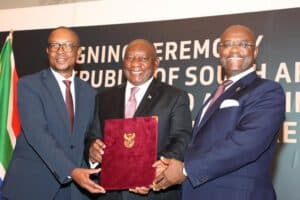The Western Cape government and Beer Association of South Africa have questioned why lockdown regulations are still in place given that Covid-19 cases are beginning to decline.

Pressure is mounting on President Cyril Ramaphosa and the National Coronavirus Command Council (NCCC) to lift the adjusted alert level 3 restrictions that came into effect in late December last year.
The NCCC returned South Africa to level 3 lockdown amid the second surge in Covid-19 infections and hospitalisations during the festive season.
Initially, Ramaphosa indicated the ban on alcohol sales, the closure of some beaches and public parks and the national curfew would only last for two weeks. However, the restrictions were extended on 11 January to much criticism from liquor traders, political parties, and business owners.
South African Breweries (SAB) lodged an application in Western Cape High Court to challenge the constitutionality of the third ban on alcohol sales. The company has also suspended the contracts of more than 500 temporary workers due to the ban, while Heineken has already retrenched parts of its South African workforce.
ALSO READ: SAB storage almost at capacity, brewers flatlining as liquor ban drags on
On Tuesday, Western Cape Premier Alan Winde and the Beer Association of South Africa (Basa) called for the lifting of the lockdown restrictions and questioned why the regulations were still in place given that the festive season was over and cases were beginning to decline.
Winde has written a letter to Ramaphosa urging him to convene a special meeting of the President’s Coordinating Council as soon as possible in order to ease some of the restrictions in the Western Cape.
Winde said he wrote to the president after Minister of Health, Dr Zweli Mkhize failed to respond to his letter last Tuesday in which he made a formal submission on the changing of some restrictions.
“We are fast approaching a month since the adjusted alert level 3 restrictions came into effect. At the time, it was made clear by the president that these restrictions would be in place for 14 days and thereafter reviewed considering the evidence,” he said in a statement.
The Western Cape government called on government to urgently lift restrictions on the ban on beaches, amend the national curfew from 11pm to 4am and allow alcohol sales offsite only, from Monday to Thursday, among other measures.
Small business owners struggling
Meanwhile, Basa warned that seven out of every eight craft brewers said they might not survive the third alcohol ban.
The association announced on Tuesday the results of a survey conducted by its member, the Craft Brewers Association of South Africa (CBASA), which highlighted the devastation craft brewers faced as small businesses due to the ban.
A poll conducted among CBASA members following the announcement made by the president on 11 January showed that 87.5% of craft brewers were at risk of shutting down permanently.
In terms of retrenchments, the survey found that 60.3% of small-business owners of craft breweries have had to retrench staff, and 41.3 % of them will have to consider destroying stock which was prepared for the festive season as it will soon expire in storage.
Craft breweries (77.8%) were also unable to pay their rent, suppliers or employees due to debt accrual.
Smugglers thriving amid booze ban
The chairperson of the South African Liquor Brand owners Association (SALBA), Sibani Mngadi, said that the only beneficiaries of the current ban were illicit alcohol smugglers, who had overpriced their products, robbing both the industry and government of much-needed sales and tax revenue.
“Alcohol excise tax contribution to the government has declined by more than 28% from R47 billion in 2019-2020 to R34 billion in 2020-2021. This R13 billion loss in alcohol tax revenue could have easily compensated for the investment needed in the procurement of vaccines and other measures needed to curb the impact of Covid-19 on our society,” said Mngadi in a statement.
Evidence of decline in Covid-19 cases
Meanwhile, Winde said since the country was placed back on level 3 lockdown in late December, there was evidence in his province that motivated for the easing of restrictions.
The premier cited the sustained decline in active cases, hospitalisations, test positivity rate, oxygen usage and healthcare worker infections.
He said the lockdown restrictions could lead to an economic disaster in the Western Cape as the province’s economy – which relies heavily on tourism and hospitality – was struggling. Finance MEC David Maynier revealed that almost all the top attractions in the province had indicated a more than 60% drop in visitors over the peak tourism season in December.
“The first two weeks of the latest alcohol ban are estimated to have cost the Western Cape economy R1 billion. This has impacted 1893 direct jobs in the retail sector and 905 induced and indirect jobs across the value chain resulting in 2,798 jobs being compromised,” Winde said.
“If the ban is to continue for a full month, which it now looks likely to do, it will end up costing the Western Cape’s economy R2 billion. This would then impact 5596 jobs.”
READ NEXT: SA’s Covid-19 infections slowing, but don’t celebrate yet
For more news your way, download The Citizen’s app for iOS and Android.
Support Local Journalism
Add The Citizen as a Preferred Source on Google and follow us on Google News to see more of our trusted reporting in Google News and Top Stories.








